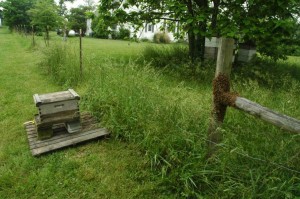After a long and vaguely hellish winter, spring is bustin’ out all over the farm. Oddly, my beehives are all thriving and I’ve already had a swarm to capture. That’s kind of early but I’m not complaining.
Below is part of something I wrote two years ago. I’ve trimmed commentary on then-current events, but the key question remains the same: will my kids’ kids even know what a real drone is?
And I can only add my recent blinding insight: honeybees are the original twerkers.
Been a great year for the nectar flow, which started very early and is still going great guns, so much so that I woke with a start last night with the realization that I’ve got three bee hives resting on a single horizontal plank, with an unprecedented mass of honey above. (File under “Complications Resulting from Unusual Natural Bounties.”)
Another consequence of the nectar bounty is that hives become so strong that they swarm. Which is really not a bad thing for the bees. But for a beekeeper, aka honey thief, you like to avoid having swarms take away half your bee population, so if you’re lucky and observant you can catch your own swarms, which I did this weekend, twice.
On Saturday, after a little set-to with my increasingly emotional 11-year-old son (another ominous trend), I stomped out of the house and wandered to the bee yard, where they were swarming for the second day in a row.
If you’ve never stood in the middle of a bee swarm, put it on your bucket list. It feels like the early stages of the apocalypse might feel, and yet it’s really just a beautiful natural thing. Basically, the bee super-organism feels it is robust enough to reproduce, so it swarms. In a first swarm, roughly half the bees (five thousand, ten perhaps) accompany the old queen and look for a new home. Upon leaving the hive they fly in mad-seeming circles, creating a cone of bees about ten yards wide and forty feet high. It is noisy and scary and exhilarating. I half expect the voice of James Earl Jones to begin booming out.
The bees in this state are about as gentle as they can be. They’ve gorged on honey prior to leaving the hive, and are merely seeking an intermediate place to settle while the scouts find a permanent location. Lucky for me, they roost on a fence post right next to the hive, the same place another swarm had chosen just yesterday (and not, say, on a branch sixty feet off the ground).
I set to putting them into a temporary hive, as I had done with Friday’s swarm.
And let me talk about the Nasonov pheremone for a brief moment. Because it means a lot to me.
When I ponder all I’ve gained in moving to the country from a house and respectably well-paid job in New York, and giving up all that goes with same — annual 401k contributions, good health insurance, paid holidays, pay! — I can now add as a compensation an intimate familiarity with the workings of the Nasonov pheremone, which is what worker bees release to orient returning forager bees back to the colony.
When capturing swarms, beekeepers are looking for the distinctive butt-up, fanning behavior (displaying the Nasonov gland) as an indication that they have succeeded in transporting the queen from the temporary roost to the intended hive destination. To start moving the swarm I scoop handfuls of bees into the box. One random scoop had what looked like a virgin queen but I wasn’t entirely sure. When I laid the scoop into the box, bingo! The timbre of the buzzing changed instantly and dozens of bees suddenly stationed themselves at the edges of the box and began the fanning action. My work was pretty much done at this point. I walked away and returned at dusk, and the hive was full. All I had to do was put the hive cover on.
It’s possible that our generation may lose bees altogether. I won’t lay out the case for bee extinction, but a few minutes of googling around, and you will at least be familiar with it. It occurs to me as I type this that our kids’ kids won’t know what a real drone is, but they will be all too familiar with the mechanized war-fighting snooping machines that are named after the least useful members of the bee family….
But that is some disturbing, dispiriting stuff, and as I have already said, today I’m not letting that sort of thing harsh my buzz.

